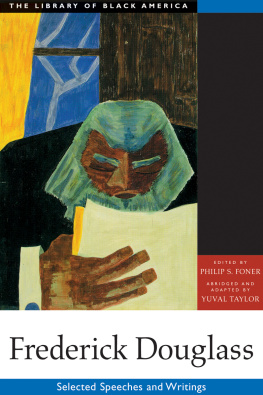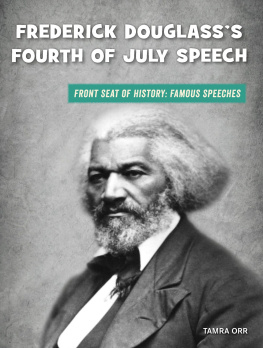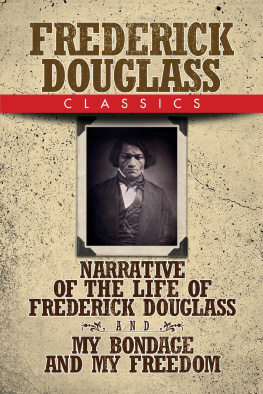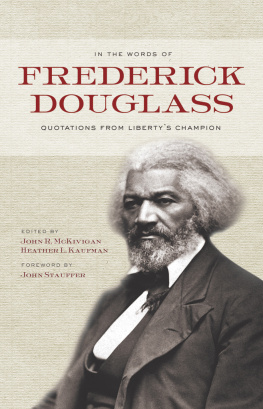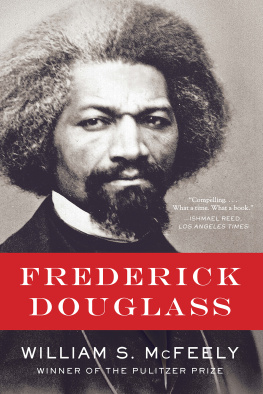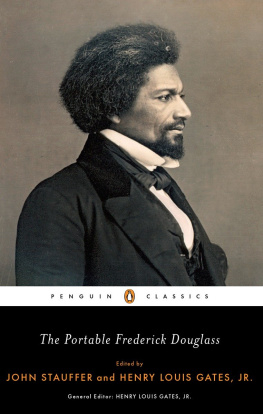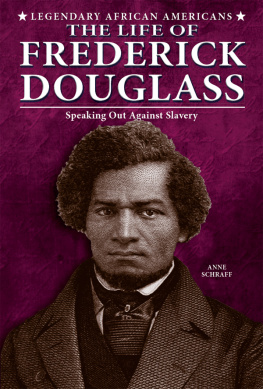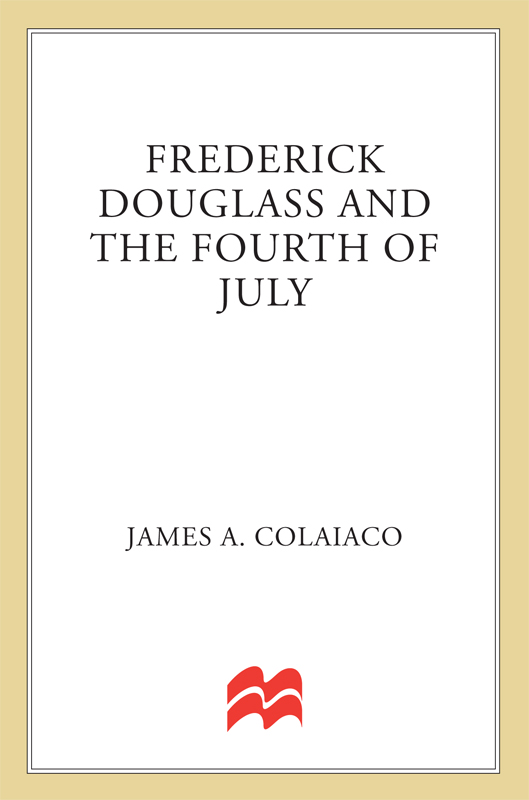Contents
Guide

The author and publisher have provided this e-book to you for your personal use only. You may not make this e-book publicly available in any way. Copyright infringement is against the law. If you believe the copy of this e-book you are reading infringes on the authors copyright, please notify the publisher at: us.macmillanusa.com/piracy.
Contents
To Nancy, my kindred spirit
Time and events have summoned me to stand forth both as a witness and an advocate for a people long dumb, not allowed to speak for themselves, yet much misunderstood and deeply wronged.
Frederick Douglass, Life and Times of Frederick Douglass
On Monday, July 5, 1852, Frederick Douglass, the former slave, made his way to majestic Corinthian Hall, located in downtown Rochester, New York, near the Genesee River. For the past few weeks, he had labored into the night, gathering his thoughts about the urgent message he wanted to give the nation. Arriving at Corinthian Hall, Douglass, the keynote speaker of the day, walked to his seat and faced his audience. With great dignity and a stern countenance, he surveyed the assemblage of mostly white people.
Since the early years of the American republic, the Fourth of July has been the day Americans reaffirm their common identity and purpose in a collective ritual. For Douglass, the day had multiple meanings. It was the anniversary of the birth of the United States of America, which, he agreed, should be celebrated; the Fourth of July was the anniversary of the Declaration of Independence, the historic document that committed the nation to the ideals of liberty and equal rights for all. But for Douglass, the Fourth of July was also a day to remember that Americas ideals remained unfulfilled for blacks enslaved in the South. Throughout his life, Douglass struggled to resolve the American dilemma, the contradiction between the ideals professed by the nations Founders and the practice of denying human rights to black Americans and other minorities.
A self-educated fugitive slave, abolitionist, advocate for womens rights, orator, journalist, and diplomat, Frederick Douglass was the most famous black person of the nineteenth century. He is best known for his three inspiring autobiographies. But his greatest legacy to America is his oratory, forged in the crucible of the battle against slavery in the years prior to the Civil War. With extraordinary courage, he had escaped from his slave master. Having taught himself to read and write while a slave, Douglass is one of the most inspiring examples of the power of literacy. Shortly after attaining his freedom, he came under the influence of the great abolitionist, William Lloyd Garrison, who stirred the nations conscience by calling for the immediate and complete abolition of slavery. As a member of Garrisons Massachusetts Anti-Slavery Society, Douglass honed his oratorical skills. After publishing his first autobiography in 1845, Narrative of the Life of Frederick Douglass, which emphasized the moral evil of slavery, Douglass made the first of two excursions to Great Britain, where he spoke from a variety of platforms, electrifying his audiences. While he initially subscribed to Garrisons rigid views, including denouncing the United States Constitution as pro-slavery, Douglasss careful study led him to embrace the document as the abolitionists greatest legal weapon.
Having taken his anti-slavery message to Britain in 1847, Douglass had achieved international recognition as a great orator. He emerged as an independent thinker, ready to create his own path. In 1847, as an offensive against slavery, he founded an abolitionist newspaper, the North Star, in Rochester, New York. To the dismay of the Garrisonians, by 1851 he had converted not only to the United States Constitution, but also to pragmatic party politics. During the next decade, as tensions over slavery between the North and the South pushed the nation to the brink of civil war, Douglass delivered hundreds of speeches throughout the North calling upon the federal government to abolish slavery in the South. Douglass warned that failing to eradicate the moral evil of slavery would arouse divine retribution.
Despite the valiant efforts of Douglass and others, slavery continued to spread. The antebellum period was dominated by a struggle between the North and the South over whether newly acquired lands would become slave or free states. The outcome would have important political consequences, including control of Congress, the office of the presidency, the composition of the Supreme Court, and ultimately the fate of the nation. In 1850, Congress passed the Fugitive Slave Law, which in effect nationalized slavery by requiring citizens in the North to assist in the return of runaway slaves. Douglass began advocating the abolition of slavery through political means, including support for anti-slavery political parties. When many black reformers, along with anti-slavery whites, believed that the best solution was to free the slaves and ship them out of the United States, Douglass remained a committed integrationist, insisting that blacks should not abandon America and its ideals. He also practiced civil disobedience as a leader in the Underground Railroad movement that assisted hundreds of fugitive slaves in their escape from the South to safe haven in Canada.
In the 1850s, Frederick Douglass and Abraham Lincolntwo giants on the stage of American historyembarked on paths that would converge on the issue of slavery. On June 16, 1858, Lincolns House Divided speech proclaimed that the nation could not survive half slave and half free. While both Douglass and Lincoln, inspired by the ideals of liberty and equality enshrined in the Declaration of Independence, agreed that slavery was immoral, they disagreed on the best method to abolish the institution. Douglass had become convinced that the Constitution was anti-slavery, but Lincoln insisted that the document did not authorize Congress to abolish the institution in the South. The most that the federal government could do, in Lincolns judgment, was to prevent slaverys extension into new territories. Lincoln hoped that, confined to the South, slavery would die a natural death. While Lincoln was convinced that preserving the Union was more important than abolishing slavery, Douglass believed that a Union with slavery was an unacceptable betrayal of the nations democratic ideals.
In the years prior to the Civil War, Douglass emerged as a formidable interpreter of the nations founding documents. Read from an ethical perspective, he argued, the Declaration of Independence and the United States Constitution were essentially abolition documents. The Preamble to the Constitution alone provided sufficient legal basis to eradicate slavery. The Constitution was designed to secure for all persons the inalienable natural rights to life, liberty, and the pursuit of happiness proclaimed in the Declaration. The Supreme Court of the United States disagreed. Five years after Douglasss July Fourth oration, in the infamous 1857 Dred Scott decision, Chief Justice Roger B. Taney, speaking for a pro-slavery Court, ruled that no black American, slave or free, was a citizen of the United States. Taney argued that according to the Constitution blacks were property, not human beings. They were not endowed with inalienable rights. The Chief Justice defended the Courts decision on the grounds that it expressed the original intentions of the nations Founders. Dred Scott essentially denied the American dilemma and was a devastating blow to the anti-slavery movement. In the minds of many Americans, the Supreme Court had definitively settled the slavery question that had plagued the nation since its inception. Black Americans were unequivocally excluded from the rights of the Declaration of Independence. Nor were they among We the people who established the Constitution. Blacks were not citizens of the United States, but aliens. If they were not included within the body politic in the first place, the nation could not logically be accused of violating its founding principles.


